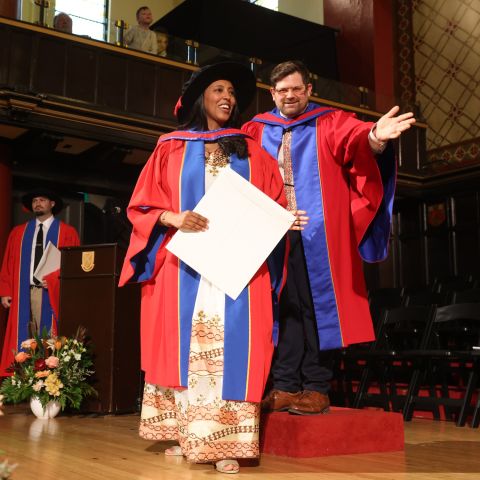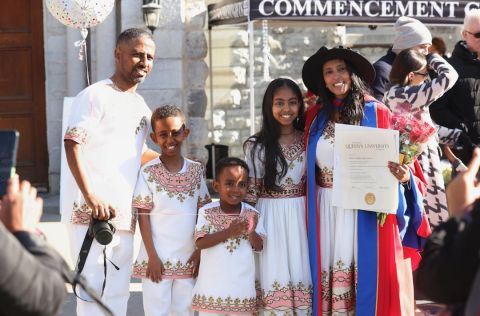

Typically, it takes no end of intellectual ability, dedication, grit, and a willingness to make personal sacrifices to earn a Doctor of Philosophy (PhD) degree. Hiwot Mekuanent, PhD’24, has all those attributes – and more – in abundance. However, if there was ever a “typical” Queen’s Law doctoral student, it wasn’t her.
Mekuanent is quick to tell you that she had working in her corner something that most doctoral students don’t: a strong support team. What’s more, she’s adamant in her belief she wouldn’t have succeeded without them. Of course, such an admission calls for an explanation. It’s coming. But first a bit of Mekuanent’s remarkable backstory is called for.
This autumn, after six years of study, (which was interrupted by the COVID-19 pandemic, a four-month medical leave, and a 16-month time-out for another reason that will be explained later), she defended her doctoral thesis: “Nothing Without Us: Participation of Persons With Disabilities in the Law-Making Process of Ethiopia.” Not only was the topic of Mekuanent’s thesis unusual, so were her life circumstances while she was exploring it. A married woman and mother, she also had been out in the working world for seven years before she began her doctoral studies. While that it itself was unusual, so too was the genesis of her academic career, which is as accomplished as it’s inspiring.
Born and raised in the East African nation of Ethiopia, Mekuanent earned her Bachelor of Laws degree at Hawassa University then a Master of Laws degree in International Human Rights Law at Addis Ababa University. After that, she took a lecturer’s job and served as director for the Disability Studies and Service Directorate at the University of Gondar in the northwest area of Ethiopia.
“During my time there I worked hard to create an inclusive environment for students and employees with disabilities,” she recalls. “Doing so exposed me to the limited participation and representation of persons with disabilities (PWDs) in the university's decision-making processes and those of other stakeholders. I wanted to understand why these issues persisted, and so I decided to look into the root causes of these problems.”
It’s an understatement to say the need to do so was pressing. As many as 17 million of Ethiopia’s 100 million people are disabled; 95 per cent of them live in poverty, many depending on families and neighbours, and begging on the streets for their livelihoods. Although Ethiopia has created initiatives (laws, policies, and strategies) to ensure that PWDs benefit from equal opportunity and full participation in development, there is a long way to make this a reality.
“The rights of PWDs are a concern that’s very personal for me. It’s something I’m passionate about,” says Mekuanent. “My younger brother, who was with intellectual disability, struggled to get access to health care, educational opportunities, and so much more. This was painful, and it posed huge challenges for him and for my family.
“My brother died five years ago, but my memories of him still motivate me. All the studying and research I’ve done – as an undergraduate, as a master’s student, and while working for my doctorate here at Queen’s Law – has been because I remember what my brother went through. I want to help others who are experiencing the kind of problems he did.”
Mekuanent’s research during her time at Gondar underscored something she’d long suspected: in Ethiopia, there’s a dearth of information about when and how PWDs are included – if they ever are – in the drafting and enactment of the laws that affect them. Despite the fact the Ethiopian constitution of 1995 explicitly states that “the State” will provide support and rehabilitation services for PWDs, that doesn’t always happen. Nor is there consistent application of the provisions of the United Nations Convention on the Rights of Persons With Disabilities (UNCRPD), which Ethiopia ratified in 2006.
Mekuanent was intent on learning all she could about the discrepancies between ideals and everyday realities and what could be done to narrow those gaps, and so she pressed ahead with her research. Among the various scholastic awards that helped her do so was one from the MasterCard Foundation (MCF) that proved pivotal. This innovative global initiative fosters the development of “the next generation of transformative leaders by enabling highly talented, service-oriented young people, primarily young Africans, to pursue higher education and cultivate their leadership potential.”
MCF funding helped Mekuanent come to Canada for doctoral studies. “I’d heard about Queen’s Law’s strong academic reputation and the University’s excellence. So, when I received the scholarship and had the chance to join Queen’s, I was thrilled. My husband and I felt Kingston was the right place for us and our two children to live while I studied to earn a PhD,” she explains.
As it turned out, their decision was savvy. Mekuanent found “a home-away-from-home” on campus at the Ban Righ Centre, where she shared life experiences and much laughter with other mature female students. Academically, she set to work under the watchful eyes of supervisor Ashwini Vasanthakumar (Queen’s Law). Under her tutelage, Mekuanent did two in-depth case studies on two laws of Ethiopia: Ministry of Finance Directive 41/2015 and the Organization of Civil Societies Proclamation 1113/2019. Each case study delved into examining the participation of persons with disabilities in the law-making process of these two laws. The evidence shows that there is improvement in the participation of persons with disabilities in law-making processes however their participation was not up to the standard set under CRPD.
The thesis Mekuanent wrote sets out a series of recommendations for Ethiopian government departments and agencies, disability organizations, civil society organizations, and other non-governmental agencies that work on behalf of PWDs.
Says Mekuanent, “I hope my findings will help Ethiopian lawmakers, disability organizations and civil society organizations become more aware of the level of persons with disabilities participation and the need to align with the standards set by the UNCRPD. By raising awareness of these essential points, I aim to encourage active and meaningful participation of persons with disabilities in the law-making process – not just tokenistic participation. This shift would ensure that the voices of persons with disabilities are meaningfully considered in shaping policies that directly or indirectly impact their lives.”
Going forward, Mekuanent is eager to continue her engagement in disability advocacy work and do further research, ideally in the employ of a human rights organization such as the United Nations agency or the World Health Organization.
Regardless, no matter what the future has in store for her, Mekuanent knows she will always have the love and emotional backing of the support team that was mentioned earlier. It includes her husband and four children, ages 12, 9, 5 and 7 months. Yes, she gave birth to two children while she was busy working on her doctorate – hence that aforementioned 16-month time-out. That’s another thing that your “typical” PhD student doesn’t do.
Surprisingly having two more little ones in her household wasn’t a burden or a distraction. “I’d never have succeeded academically if it wasn’t for the unwavering love and support of my family. My kids call me their ‘hard-working mom.’ That gives me joy, and it makes me smile,” she says with a laugh.
By Ken Cuthbertson, Law’83